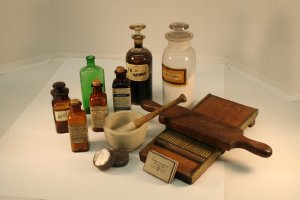The pharmacy collection at the Edward Hand Medical Heritage Foundation highlights over two hundred years of the pharmacy profession. The collection includes over one thousand bottles of chemicals and herbs used by pharmacists to make and dispense remedies for many of the diseases and illnesses of the day; as well as the accessories and equipment necessary to ply their trade.
Initially known as apothecaries, early pharmacists prepared and dispensed remedies while offering medical advice to many in the community. In very rural areas of the country, there were no doctors available so the local apothecary or pharmacy was the only medical resource to many.
The 18th and 19th centuries saw many pharmacists creating and distributing their own medicines, commonly referred to patent medicines. Claiming cures for scores of diseases and ailments, these pharmacists kept the formulas for these miracle cures secret. In the late 18th century, pharmacists began filling prescriptions for medicines from doctors. This began the process of separating the professions of the doctor and the pharmacist although pharmacists continued to dispense their own cures and offer advice for many years to come.
While Lancaster PA, the home of the EHMHF, has been the home of several pharmacies as far back as the early 18th century, the first American college to formally train pharmacists was the Philadelphia College of Pharmacy, founded in 1821. According to the College of Pharmacy and their publication commemorating ther one hundred year history, they sought to provide relief of human suffering and to conserve the public health.
This collection of pharmacy equipment and accessories is made up of items that would be found in nearly all 19th and early 20th century pharmacies. Included are such items as pill rollers, mortar and pestles, bulk medicine bottles, and the pharmacist log book used to record dispensed medicines.
Many bottles, pharmacy accessories and shop furniture from our collection are housed in an 1850s pharmacy unit once located in the Canis Pharmacy in New York City. Visitors to our museum can see authentic 19th century medicines displayed as they once were in an autentic 19th century pharmacy.

